ATSE Awards 2021
Clunies Ross Award — Entrepreneur of the Year
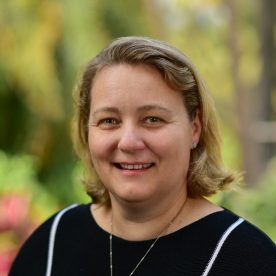
Adjunct Professor Leanne Kemp
Clunies Ross Award — Entrepreneur of the Year
Leanne Kemp is a leading figure in the technology sector and recognised internationally as an innovator, entrepreneur and leader.
She is the founder and Chief Executive of Everledger. At Everledger, Leanne Kemp created an independent platform leveraging blockchain technology which provides a secure and permanent digital record of an object’s origin, characteristics and ownership across many global supply chains and industries. She invented and patented the technologies which have proven to be a game changer for Everledger, impacting a number of industries helping to build confidence in claims of origin, legality, environmental protections and human rights.
Leanne Kemp has also just completed two terms as Queensland’s Chief Entrepreneur where she shared her experience and knowledge with thousands of start-up businesses and SMEs. She is an appointed advisor for the OECD, the United Nations, the World Economic Forum and a Director for the World Trade Board.
Clunies Ross Award — Innovation
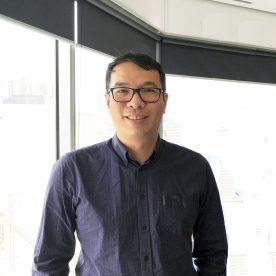
Professor Alan Wong
Clunies Ross Award — Innovation
Professor Alan Wong is an inventor and innovator whose new approach to identifying fire risks in power networks has spawned an international business.
Professor Wong designed and developed Early Fault Detection technology which is able to detect and locate potential threats to power grids, allowing these threats to be addressed before the grid fails, protecting against potential catastrophic outcomes.
Since being patented and introduced to the market, the technology has been taken up by companies in Australia, Asia and North America. It’s detected numerous failing high-voltage conductors and prevented potential bushfires and electrocution.
Ninety-five per cent of the Early Fault Detection product is manufactured locally in Victoria, generating high-tech and advanced manufacturing jobs.
Clunies Ross Award — Knowledge Commercialisation
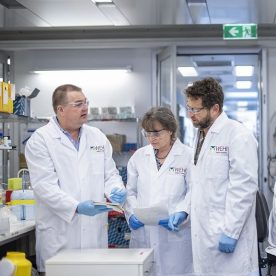
Professor Anne Voss, Associate Professor Tim Thomas, Jonathan Baell
Clunies Ross Award — Knowledge Commercialisation
Professor Anne Voss, Associate Professor Tim Thomas and Professor Jonathan Baell have developed an entirely new approach to cancer treatment that essentially puts cancer cells to sleep, without the harmful side effects caused by conventional therapies.
Cancer is a leading cause of death worldwide, accounting for nearly 10 million deaths in 2020. It kills through unrestrained and abnormal cell proliferation. The team from the Walter and Eliza Hall Institute and Monash University has developed a new class of inhibitors which arrest that proliferation, without causing DNA damage.
A licensing deal with a major pharmaceutical company, has the teams’ discoveries at its base with a drug that has now entered Phase 1 clinical trials.
Batterham Medal for Engineering Excellence
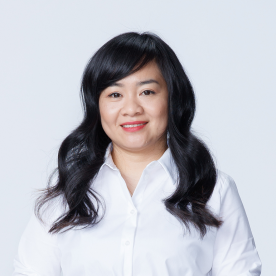
Dr Kate Nguyen
Batterham Medal for Engineering Excellence
Dr Kate Nguyen is an early career researcher whose ground-breaking work is making buildings safer and construction more sustainable.
The 2017 Grenfell Tower blaze in London that claimed 72 lives exposed the dangers of aluminium composite cladding. In the aftermath of the disaster, and in collaboration with industry, Dr Nguyen came up with a light-weight, cost-effective alternative cladding material using ceramic particles that will not combust during a structural fire. She has also developed various nano-based construction products that were analysed in commercial buildings, such as the City Hall in Utrecht, the Netherlands.
She has also quickly established herself as a national expert in advancing the sustainability of fire-resistant construction materials. Partnering with industry, Dr Nguyen has provided a solution for the safe removal and transformation of combustible construction waste into high value, fire-retardant pre-fabricated building materials.
Dr Nguyen is currently the leader of the Innovative Fire and Façade Engineering Group at RMIT University, collaborating closely with some of the major construction partners who are end-users of her innovative research.
ICM Agrifood Award
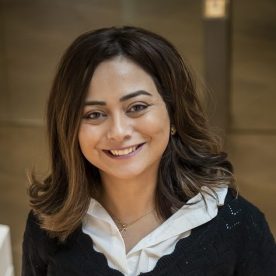
Dr Anna El-Tahchy
ICM Agrifood Award
Dr Anna El-Tahchy is an innovator and respected bio-chemist who is leading efforts to revolutionise the flavour and sustainability of plant-based food.
There’s been an explosion in demand for plant-based food options in recent years but many of the new products lack flavour and an appealing mouthfeel or texture. Dr El-Tahchy has been directly involved in the establishment of Nourish Ingredients (founded by former CSIRO scientists), which has created a new science area to address this need.
Using their proprietary technology, Nourish delivers fat alternatives through the genetic manipulation of yeast strains. Using a fermentation process, these fats can be tailored to exactly match the flavour profile of beef, pork, chicken, seafood and dairy products.
Nourish Ingredients currently employs around 20 people but is growing fast with Dr El-Tahchy responsible for building its team of scientists and driving innovation and opportunities for scale, including partnering with innovative brands and leading food technology organisations to unlock the potential of the plant-based space.
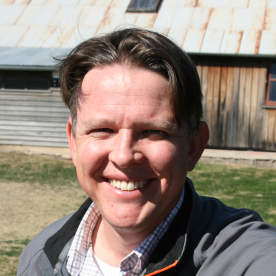
Dr Lindsay Bell
ICM Agrifood Award
Dr Lindsay Bell is a world leader in farming systems research whose innovations have helped dryland crop and livestock farmers manage climate variability.
Dr Bell’s research focuses on redesigning cropping systems and re-integrating crops and livestock to more efficiently use highly variable rainfall to increase profitability and reduce losses during droughts.
He has been instrumental in developing dual-purpose canola and designing protocols to help farmers graze their grain crops at a time that reduces the risk of grain yield losses and optimises income from both grain and livestock. His research has shown this system has the potential to increase crop returns by up to 75 percent and farm profits by up to $200 per hectare.
Dr Bell is widely regarded for his communication of science to a range of audiences and his research has been highly cited in scientific and wider literature.
Ezio Rizzardo Polymer Scholarship
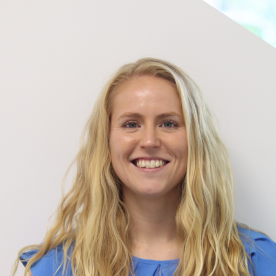
Georgia Hunter
Ezio Rizzardo Polymer Scholarship
Georgia Hunter is an outstanding PhD student at Monash University with two STEM degrees – a Bachelor of Engineering and a Bachelor of Science – who is working to improve the properties of multi-polymer materials.
She is looking to harness design strategies found in nature and develop numerical models to achieve the most desirable combination of properties. With exciting possibilities unlocked with the advancement in multi-polymer 3-D printing, her research proposal could contribute to the manufacture of polymer materials that are as strong and as tough as natural materials. This has been difficult to achieve using ‘conventional’ manufacturing techniques.
Georgia Hunter is continuing her passion for STEM not only in her work but also by teaching the next generation of engineering students as a university tutor and demonstrator.
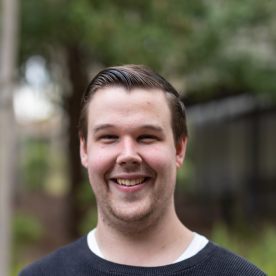
Hayden Robertson
Ezio Rizzardo Polymer Scholarship
Hayden Robertson’s PhD program is improving the current understanding of how stimulus-responsive polymers that are grafted onto a substrate to form a “brush” behave in complex media.
Polymer brushes can be used to coat various surfaces including silicon, gold, metal oxides and other polymers. Because their behaviour can be easily controlled and tuned by the presence of different salts or solvents, they have application in many fields, including targeted drug delivery, lubrication, altering the conductivity of a material’s surface and controlling the transport of small particles. They can also be used as anti-fouling agents to keep ship hulls free of contaminants and for organic light emitting diodes in television screens.
Improving the understanding of how stimulus-responsive polymer brushes react in different environments is important as it will lead to the deployment of polymer brushes as smart interfaces with tuneable properties.
As well as conducting his research, Hayden Robertson has also acted as a Student Ambassador for the Bachelor of Science program at the University of Newcastle and been part of the university’s SMART program, delivering science and engineering shows to the general public.
David and Valerie Solomon Award
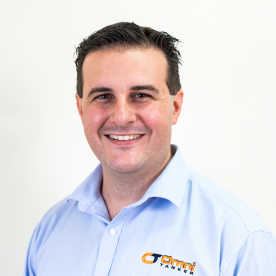
Dr Luke Djukic
David and Valerie Solomon Award
Dr Luke Djukic is an outstanding aerospace engineer who is improving the safety and efficiency of transporting dangerous goods such as highly corrosive chemicals internationally.
Dr Djukic has dedicated his career to growing the Australian advanced composites industry, specialising in research and innovation. During the past five years he’s worked as Chief Technical Officer at Omni Tanker and under his technical leadership this Australian enterprise has become internationally recognised for its high integrity, technology-based dangerous goods transport products.
Omni Tankers’ thermoplastic-lined carbon fibre composite tank solutions are now servicing Australia, Europe, Northern America, New Zealand and Saudi Arabia in the form of United Nations portable tank containers, swap tank containers and road tankers.
Dr Djukic is a member of a United Nations working group which is developing transport regulations that will have substantial impact, bringing worldwide safety improvements as they permeate international standards.
Thank you to the sponsors of the ATSE Awards 2021
GOLD SPONSOR

As Australia’s second-largest national science agency, the Defence Science and Technology Group at Department of Defence, brings together interdisciplinary expertise from Australia and the world to address Defence and national security challenges. Our role is to work closely with the Australian science, technology and innovation eco-system to deliver scientific advice and solutions that provide capability enhancement for Defence and the national security community.
Our scientists work with our counterparts from universities, co-operative research centres, academies and industry to tackle a range of problems, across the maritime, land, air, space and cyber domains.
Our partnerships with industry and universities are integral to giving Australia a technological and capability edge. Through More, Together: Defence Science and Technology Strategy 2030 we are building a comprehensive, coherent and agile innovation system. We are collaborating across Government, industry and academia to grow our talent pipeline and inspire future generations of Australians into science, technology, engineering and mathematics careers.
SILVER SPONSORS

The Department of Industry, Science, Energy and Resources (DISER) has a central role in enabling economic growth and job creation for all Australians. The department’s effort relies on building strong relationships between businesses, entrepreneurs, employees, the science community, government, regulators and international partners. It supports businesses and employees as they manage market disruptions and seek new opportunities, including those presented by digital technology.
Skills in science, technology, engineering and mathematics (STEM) are crucial to the jobs of the future. Supporting science and commercialisation is a pillar of the department’s work. The department facilitates the development and uptake of new ideas and technology, and translating them into commercial activity. DISER encourages collaboration between businesses and researchers to deliver better scientific and economic outcomes for Australia.

The Commonwealth Scientific and Industrial Research Organisation (CSIRO) is Australia’s national science agency and innovation catalyst, collaborating to boost Australia’s innovation performance.
We work with industry, government and the research community to turn science into solutions to address Australia’s greatest challenges, including food security and quality; clean energy and resources; health and wellbeing; resilient and valuable environments; innovative industries; and a secure Australia and region.
For over 100 years, we have been the mission-led national science agency, collaborating across the innovation system. These primary objectives help us to deliver on our purpose:
- Conduct and encourage the uptake of world-class scientific research.
- Mobilise and develop the best talent for the benefit of Australia.
- Manage national research infrastructure for the nation.
- Ensure the sustainability of CSIRO.

Reimagine engineering and computing disciplines
As Australia’s national university, The Australian National University (ANU) attracts leading academics and nurtures students from across the globe. Excellence is embedded in our approach to research and education. As we recover and rebuild from the COVID-19 pandemic, Australia needs its national university to be leading: in research, in education, in driving societal transformation and new enterprise, and in providing a cultural and intellectual resource for our nation.
The ANU College of Engineering and Computer Science is an interdisciplinary venture, with the aim of bringing the world’s leading experts to the ANU to find and solve problems – not just engineers or computer scientists, but also the brightest minds both from industry and other academic disciplines, with varied backgrounds and areas of expertise. We will bring together expertise on people, technological systems, and science to ask the right kind of questions and give shape to new bodies of knowledge responsible for creating a more sustainable, responsible and safe world. Together we will reimagine the traditional engineering and computing disciplines for the 21st Century.
BRONZE SPONSOR

ANSTO leverages great science to deliver big outcomes.
We partner with scientists and engineers and apply new technologies to provide real-world benefits. Our work improves human health, saves lives, builds our industries and protects the environment.
ANSTO is the home of Australia’s most significant landmark and national infrastructure for research. Thousands of scientists from industry and academia benefit from gaining access to state-of-the-art instruments every year.
ATSE Awards 2021 – Assessors
We are grateful to the following individuals who have volunteered their time to assess the ATSE Awards 2021:
Prof Marilyn Anderson, Dr Mary Ann Augustin, Dr Julie Beeby, Prof Simon Biggs, Dr Amanda Caples, Prof Mark Cassidy, Dr Helen Cleugh, Dr Janis Cocking, Dr Peter Coldrey, Dr Ian Dagley, Dr Eileen Doyle, Prof Emer Lindsay Falvey, Mr John Grace, Dr Erol Harvey, Prof Malcolm Hickey, Prof Emily Hilder, Dr Anita Hill, Prof Sandra Kentish, Prof Iven Mareels, Prof Eric May, Mr Wayne Osborn, Dr Brett Phillips, Mr Ross Pilling, Prof Laura Poole-Warren, Prof Timothy Reeves, Dr Ezio Rizzardo, Deirdra Shears, Prof Anne Simmons, Prof Emer Maree Smith, Prof Thomas Spurling, Dr Jenny Stauber, Dr Meryl Williams